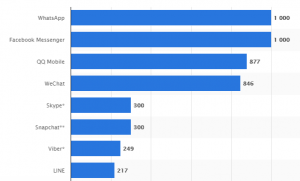Digital transformation. It’s not only a buzzword but a global process spanning enterprises across various niches and verticals. The question arises here — what does it really mean to be a digitally mature enterprise today? No matter, in which industry you are. Likely, you are now trying to adjust your business models and processes to the new normal in order to fully participate in the digital economy. Backing at my experience in mediating between digital transformation service providers and businesses across various industries, I would like to share with you my several insights on what makes enterprises genuinely digital today.
Incorporating Enterprise Mobility
To lead the ventures out of the crisis, entrepreneurs should be aware of how to reshape businesses to meet the digital age. The first step is investing in enterprise software development. Digitally mature companies are equipped with enterprise mobility solutions and cloud services. Corporate apps, cloud-based collaboration platforms, productivity tools, and business performance tracking solutions. There are a lot of options to incorporate mobile technologies into your business processes and team collaboration. All this helps companies keep control over all of their business and financial processes anytime and from anywhere, using their mobile devices. Moreover, the use of mobile applications improves operational business efficiency and increases customer satisfaction.
This year is also seeing new enterprise mobility trends that include the ever-growing Internet of Things, the increase of geolocation-based services, the evolution of AI-driven business analytics tools, and the proliferation of Bring Your Device (BYOD) culture.
Digitally mature enterprises comparatively easily accept emerging tech bringing changes into their internal workflow and making it automated, faster, and more efficient. The ability to incorporate tech disruptions in business processes gives these companies an undeniable advantage in the competition.
Customers Co-Create Your Company’s Vision

As mentioned above, digital transformation equips companies with intelligent business tools that allow researching customer personas and their real problems at a whole new level, as well as conducting field research and exploring user behavior in a natural online environment.
With more data about customers and their experience with the brand (and its products or services), companies can involve customers in goal-setting, road-mapping, and strategic planning. Digitally mature enterprises invest in the development of custom intelligent business tools that allow them to access more information about existing and potential buyers and build more successful business models, marketing strategies, and develop better products.
On the other hand, digital enterprises pay more attention to collecting and analyzing consumer feedback in the online world. It is a huge source of invaluable insights into the brand’s strengths and weaknesses that help it self-improve, pursue the curve of evolution, and dominate in the market.
Data-Driven Decision Making
The opinion-backed approaches to business strategies recede into the background. Today, digitally mature enterprises are more data-oriented. Data-driven decision-making is taking advantage of the business. While considering the expert opinion, the companies also rely on what real and unprecedented data says. The analytics software powered by artificial intelligence, IoT technologies, and machine learning provides real-time data collecting and precise forecasting scenarios in different operational areas.
All of us know how it feels to spend long hours in meetings discussing opinions on what would be better for a product or a company. Although brainstorming and discussions remain part of decision-making and product development cycles, forward-thinking companies strive to augment their product and business strategies with data-driven insights. They let us see a more realistic picture and dictate the right direction to move.
Strategic Data Collection

Digitally mature enterprises are ambitious about leveraging customer and competitor data to forecast different business outcomes and make the best decisions leading to skyrocketing success in the market. It doesn’t mean they collect all data possible, but they gather lots of them today.
From smart sensors, real-time monitoring tools, AI-powered software, and continuous intelligence to traditional customer surveys and questionnaires, digitally mature companies collect and process a lot of data that helps them timely react to critical situations and keep up with what is happening in the market.
Processing the large volumes of continually updating data about a target audience, business processes, and the industry requires having new, more robust software. That’s why we also witness the fast-growing demand in Big Data solutions.
The Very Intentional Automation
Human talents are too precious to be wasted on performing day-to-day tasks and repetitive operations. That’s why many intelligent enterprises invest in the automation of all business processes to leave more time for creative work that requires a “human” touch.
Business process automation is aimed to systematically replace all manual, time-consuming, and repetitive processes with smart rule-driven automation solutions that perform all the routine work instead of humans, simplify processes and give more space for creativity in business and management. Usually, this is achieved with business automation tools spanning various areas, from social media management tools (like Buffer or Later), automation platforms (e.g., Zapier, IFTTT) to rule-driven solutions for online advertising, and more.
Persistent Experimentation

There is no business creativity if there is no continuous experimentation. Regardless of the industry, today’s market requires applying a bit more creativity and thinking outside the box to stand out from competitors. Digitally mature enterprises willingly experiment with new approaches to their corporate work organization, customer service, product creation, and online brand promotion. Modern digital tools and cutting-edge technologies empower us to incorporate innovations in every area of business. We should be ready to accept changes, timely give up traditional thinking, and try to innovate.
Also, there are many situations when data required for data-driven decision-making aren’t available, and we need to experiment with new methods or utilize different types of data to solve a problem. Here, experimentation can be deployed too. It might be achieved by A/B testing, quasi-experiments, or just by trying new ideas and openly discussing them with your customers.
Conclusion
The digital era requires us to learn new lessons and quickly adapt to the new rules dictated by the fast-changing needs of tech-savvy customers and market landscape. Particularly, after the Coronavirus lockdown, most of the companies have started implementing digital transformation at different levels and in various operational fields more actively than before. To stay competitive and successfully enter the new economy, businesses are required to become digitally mature. Hopefully, my insights have helped you shape a better understanding of digital transformation processes in a business and what companies need to achieve digital maturity in 2020.
Business & Finance Articles on Business 2 Community
(32)





